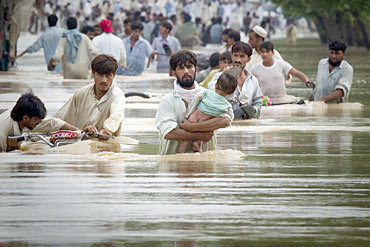 More than 800 people have died and at least one million affected by flash floods triggered by the worst monsoon rains in Pakistan in eight decades, officials and the United Nations said on Saturday.
More than 800 people have died and at least one million affected by flash floods triggered by the worst monsoon rains in Pakistan in eight decades, officials and the United Nations said on Saturday.
The death toll in the northwestern Khyber-Pakhtunkhwa province alone has risen above 800, said provincial Information Minister Mian Iftikhar Hussain.
Reports of deaths had come in from several districts in the northwest, which was worst hit by rains and floods this past week.
Over 100 people were missing and more than 26,000 were stranded, Hussain said. Some 50 deaths were reported in Punjab province while over 30 people have died in Pakistan-occupied Kashmir, officials said.
At least one million people in the northwest have been affected by the worst monsoon since 1929, the UN Office for the Coordination of Humanitarian Affairs said.
Torrential rains had breached flood defences and caused many rivers to burst their banks. Various areas in Khyber-Pakhtunkhwa, including Peshawar, Charsadda and Nowshera, were affected by flooding for the fifth day on Saturday.
Provincial capital Peshawar, which has a population of about three million, has been cut off for the past three days. Some 200 Chinese nationals working on a hydropower project were trapped in Kohistan district.
People continued to flee the inundated areas in trucks and makeshift boats. Rescuers were struggling to reach inundated areas where flooded rivers have swept away roads and bridges and snapped communication links.
Geo News channel aired dramatic footage of riverside houses and hotels being swept away by the swollen Swat river in the Kalam area. Reports from the region said over 300 houses had been destroyed by the rains and flooding.
In Punjab, about 3,000 people were stranded in Taunsa Sharif due to floods. Over 100 villages have been flooded in Mianwali. An emergency was declared in Dera Ghazi Khan, Bhakkar, Muzaffarghar and Rajanpur as they could be affected when inflows of up to 900,000 cusecs cross the Taunsa Barrage during August 1-3, officials said.
The Kohlu, Nasirabad, Jhal Magsi and Barkhan areas of Balochistan too were affected by floods. Many people made homeless were living in the open and officials feared they could be affected by the outbreak of water-borne diseases.
The deluge also submerged millions of acres of agricultural land. Though floodwaters were receding in the northwest on Saturday, officials said rescuers were facing problems reaching affected people because of damage to roads and bridges.
The UN said the extent of the damage could only be ascertained after the floodwaters receded and the immediate priority is providing shelter, healthcare, drinking water and food to the affected people.
UN officials said they were also concerned that swollen rivers flowing south would carry the floods to Sindh province, where heavy rain has been forecast in the next few days.
The Pakistan army said all available troops have been mobilised for relief operations. Seventeen helicopters and over 50 boats were being used for relief work and to transport affected people to safer areas. Over 14,000 people have been rescued by the troops so far.
Helicopters had dropped 50 tonnes of rations and 5,000 food packets in flood-hit areas, the army said. Military engineers are working to reopen roads and repair bridges, it said.
Image: A man wades through waist deep waters with his child while escaping floods in Risalpur, located in Nowshera district of Pakistan on Friday
Photograph: Adrees Latif / Reuters





